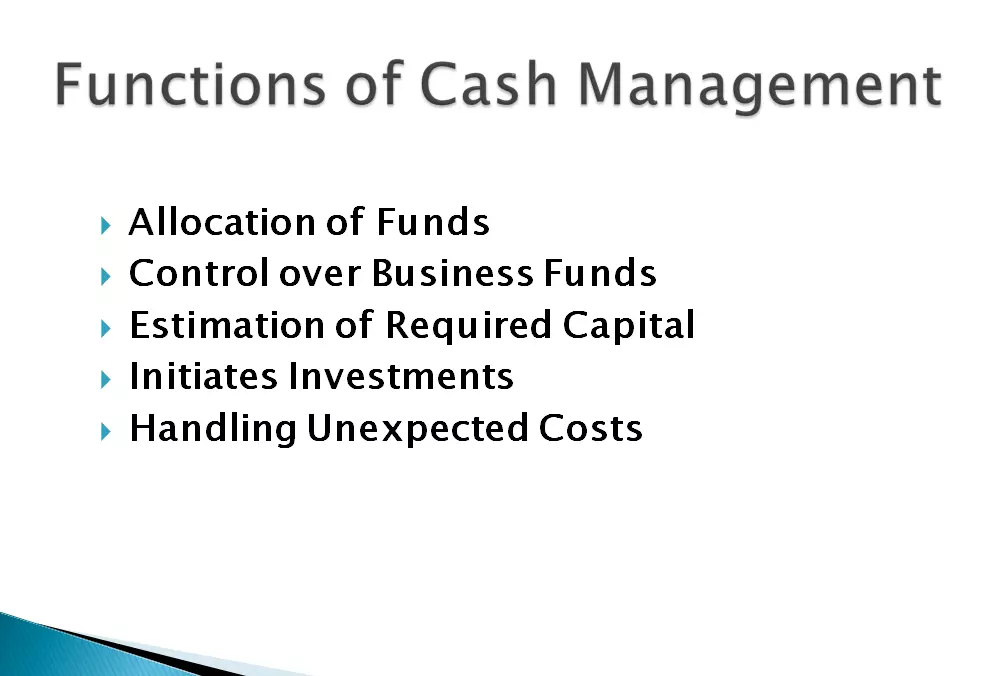Meaning of Cash Management
Cash management involves controlling both the bank balance and the cash balance, including short-term deposits. For cash management purposes, the term cash is used in this broader sense, i.e., it covers cash, cash equivalents, and those assets that can be immediately converted into cash. A financial manager is required to manage the cash flows, including both inflows and outflows, resulting from the company’s operations.
Cash management involves optimizing cash as an asset, and for this purpose, the financial manager has to make various decisions from time to time. They serve as the cash flow director of the company. Even if a company is highly profitable, its cash inflows may differ from its cash outflows. He has to manipulate and synchronize the two for the advantage of the company by investing excess cash, if any, as well as arranging funds to cover the deficiency.
Objectives of Cash Management
The basic objectives of cash management are two-fold:
1) Meeting the Payment Schedule
In the ordinary course of business, companies have to make continuous and regular cash payments to employees, suppliers of goods, and other parties. At the same time, there is a constant inflow of money through collections from debtors. A primary objective of cash management is to meet the payment schedule, i.e., to have sufficient cash to complete the cash disbursement needs of a business. The importance of money necessary to complete the payment schedule must be considered. The advantages of sufficient cash are:
i) The connection with the bank is smooth.
i) It helps in promoting good relations with trade suppliers and creditors of raw materials, as immediate payment may help their cash management.
iii) It prevents bankruptcy or insolvency that may arise from a company’s inability to meet its obligations.
iv) A trade discount can be obtained if payment is made by the due date.
v) To capitalize on favourable business opportunities that may arise periodically,
vi) It leads to a strong credit rating which enables the firm to purchase goods on favourable terms and to maintain its line of credit with banks and other resources of credit.
vii) Finally, the firm can meet unanticipated cash expenditure with a minimum of strain during emergencies, such as strikes, fires or a new marketing campaign by competitors. Keeping large cash balances, however, implies a high cost; the advantages of prompt payment of cash can well be realized by sufficient and not excessive cash.
2) Minimizing Funds Committed to Cash Balances
The second objective of cashment is to minimize cash balances. In minimizing the cash balances two conflicting expectations have to be a high level of cash balances that will, as shown above, ensure prompt payment together with all the advantages. But it also implies that large funds will remain idle, as cash is a non-earning met and the firm has to forego profits. On the other hand, a low cash balance may indicate a failure to meet the payment schedule. The aim of cash management should be to have an optimal amount of cash balance.
Related Articles:
- nature of business meaning
- nature of international business
- scope of international marketing
- determinants of economic development
- nature of capital budgeting
- nature of international marketing
Importance of Cash Management
Cash management involves taking the necessary actions to maintain sufficient cash levels to meet operational and capital requirements and to maximize yields on short-term investments of pooled funds, i.e., money. A well-designed cash management program is a necessary component of a municipality’s overall financial management.
Such a program benefits the city or town by boosting non-tax revenues, enhancing control and oversight of cash, expanding connections with members of the financial community, and reducing borrowing costs—all while maintaining the safety of the municipality’s funds. The reasons why cash management is important for a company:
1) Cash management is also necessary to deal with contingencies such as fire, breakdown of machinery, payment of compensation in case of any lawsuit going against the company etc.
2) Cash management assumes greater importance when a company has taken debt because interest payments are fixed, and the company has to pay them; any delay in interest principal repayment or amount of debt can even result in the company becoming bankrupt. Therefore, cash should always be there for payment of such expenses.
3) Cash management is mainly essential for those businesses that make sales as well as purchase credit as creditors can demand money anytime therefore a company needs to manage cash.
4) In this dynamic business world there is always a scope of takeover that is company can buy another company if it thinks that it is undervalued, cash will play a key role in a successful takeover.
5) Since global commodity prices are fluctuating companies need cash to take advantage of the decline in the raw material prices of the company’s product.
Functions of Cash Management
The functions of cash management are given as follows:
- Allocation of Funds
- Control over Business Funds
- Estimation of Required Capital
- Initiates Investments
- Handling Unexpected Costs

a) Allocation of Funds: It is the responsibility of the cash manager to determine the allocation of funds, including the recipients and the intended purposes. This includes making informed decisions regarding the distribution of financial resources.
b) Control over Business Funds: Cash management has complete control over the cash resources available in the organisation. It plans how funds are utilized on organisational projects.
c) Estimation of Required Capital: Finance managers are responsible for accurately calculating the necessary capital based on anticipated profits, projected costs, and the future policies and programs of the organization. Their role is important as they ensure the financial stability and success of the firm.
d) Initiates Investments: Cash management ensures that extra funds in the business are invested in the best market opportunities.
e) Handling Unexpected Costs: Cash management handles costs that may arise as a result of unexpected situations, for example, the breakdown of machinery.
Features of Cash Management
The features of cash management are as follows:
a) It ensures a steady and adequate supply of funds for business operations.
b) It ensures that cash designated for investments lands in safe ventures.
c) It facilitates the optimum utilization of organisational funds.
d) It makes timely payment of cash in the normal course of business.
e) It minimizes the amount blocked up as a cash balance. The business should have the optimal amount of cash balance.
Benefits of Good Cash Management
a) Minimizes Business Stress: Having good cash flow management facilitates the smooth running of business operations. The management does not have to be concerned about how business obligations will be met.
b) Facilitates Business Expansion: Having swift cash flow management reduces reliance on external business resources such as commercial bank loans thus allowing rapid business expansion.
c) Ensures Optimal Cash Flow: A good cash management policy enables managers to have a better understanding of cash inflows and outflows as and when the need arises.
d) Building Business Image: Good cash flow management helps a business to settle its debts on time which in turn enhances trust between the firm, its suppliers and creditors.
Motives for holding cash
Three primary considerations in determining the amount of cash or liquidity as outlined by Lord Keynes (a British Economist) areas follows:
a) Speculative needs
Companies would like to capitalize on profit-making opportunities arising from fluctuations in security prices, commodity prices, foreign exchange rates and interest rates. A financially robust company is better prepared to exploit such bargains. However, for most firms, their available borrowing capacity and marketable securities would be sufficient to meet their speculative requirements.
b) Precautionary needs
There may be some uncertainty about the magnitude and timing of cash inflows from the sale of goods or services, the sale of assets, and the issuance of securities. Likewise, there may be uncertainty about cash outflows related to purchases and other financial obligations. To protect itself against unexpected events, a company may always need to maintain a cash balance.
c) Transaction need
Cash helps cover day-to-day expenses and meet other debt payments of the companies. Normally, the collection of cash (from the sale of goods and services, the sale of assets, and additional financing) is not perfectly synchronised with the disbursement of cash (for the purchase of goods and services, purchase of capital assets, and meeting other liabilities). Hence, some buffer cash balance is required most of the time.
